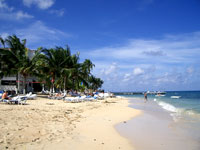 Overview: It's easy to wax lyrical about Jamaica, the famous island in the
north Caribbean. From the the glorious glow of its sunsets, to the
unique and engaging ways of its people, its alluring white sandy
beaches, lush green mountains and sparkling waterfalls - all of
these stunning features can inspire the poet in anyone. The beauty
of this island paradise has drawn visitors for centuries. At first, it was the wealthy few who were privileged to enjoy
the unspoilt tropical delights of Jamaica, but today the northern
and western coastlines of the island bristle with tourist resorts
and 'all-inclusive' hotels. Natural attractions have been
commercialised to cope with the crowds, yet somehow, this
commercialisation has not spoiled Jamaica. It still presents a
magnificent kaleidoscope of colour and beauty that makes
holidaymakers sad to leave, and vow to return. The name Jamaica originates from the pre-colonial native
inhabitants of the area, the Arawak Indians, to whom
meant 'land of wood and water'. There is little
left of the Indian culture: after being discovered by Columbus in
1494, Jamaica was ruled by the Spanish for 150 years and then by
the British for the next 300 years. Independence came in 1962 to
the Jamaican people, who are now a warm blend of different cultures
and nationalities, though significantly African-based due to the
number of imported slaves who endeavoured to keep their home
traditions alive while being forced to labour on the
plantations. There is, however, a little trouble in this island paradise: the
Jamaican people on the whole are poor, and very reliant on tourism
for their living. Some visitors object to being harassed by
vendors, unlicenced taxi drivers, hair-braiders and the like. Petty
crime is also a problem. These minor irritations, however, should
not keep anyone away from savouring the spirit of Jamaica, which is
as rich as the lilt of the local patois and the rhythms of the
reggae music for which the island is famous.
|